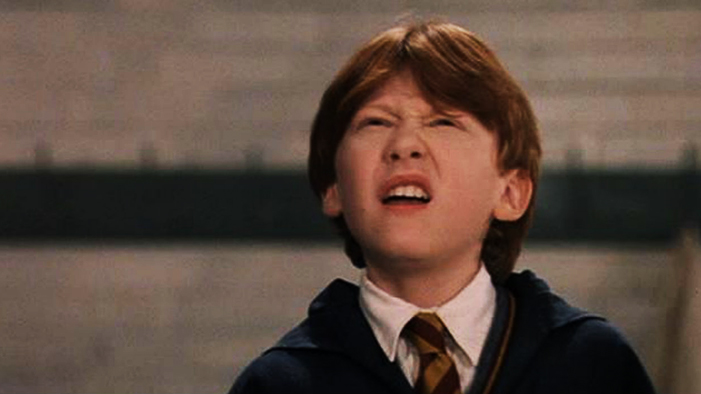6 British Words from Harry Potter That I Never Understood

I started reading Harry Potter when I was seven years old and had never seen The Great British Bake Off, Peep Show, or The IT Crowd. I was an American who didn’t know what a “lift” or a “boot” was and had never heard the word “dodgy.” Mostly I just used context clues, figured it out, and moved on with my life.
But there were times when I came across words whose meanings escaped me entirely. I spent whole years of my life skipping over them and never looking them up because, I don’t know? Because I thought I was better than that? Because J.K. Rowling trusted me to be familiar with British culture and I didn’t want to admit that I wasn’t? We’ll never know. Anyway, these are those words.
1. Budgerigar
Example: “‘And finally, Bungy the budgie has found a novel way of keeping cool this summer. Bungy, who lives at the Five Feathers in Barnsley, has learned to water-ski! Mary Dorkins went to find out more…’
Harry opened his eyes. If they had reached water-skiing budgerigars, there was nothing else worth hearing.”
I do not have the clarity of language to tell you how shocked I was to learn that a budgerigar is simply what people in the U.K. call a parakeet. I was picturing a badger. A water-skiing badger is hilarious. A water-skiing parakeet, however? I just don’t know how to feel about that.
2. Wotcher
Example: “Wotcher, Harry!”
This one plagued me for years. But it wasn’t until I started writing this very article that I finally got around to Googling it and discovering that “Wotcher!” is an old informal greeting, possibly Cockney in origin, possibly a contraction of “what cheer.”
3. Tea cozy
Example: “[Dobby] was wearing a tea cozy for a hat, on which he had pinned a number of bright badges…”
This one is less about British culture and more about me being a fundamentally flawed human being. I don’t drink tea. I don’t even mess with coffee. The closest I have ever come is hot chocolate, which I make with water rather than milk, eager as I am to be universally hated. So when we were told Dobby was using a tea cozy as a hat, I had no inkling of what a tea cozy was or why he shouldn’t be wearing one on his head. If pressed, I suppose I would have guessed it was a sweater for teacups, and I’m not entirely convinced that it’s not.
4. Candyfloss
Example: “Slightly cross-eyed, with shoulder-length white hair the texture of candyfloss, he wore a white cap…”
Candyfloss sounds EXACTLY like the sort of charming wizard nonsense you’d find in Honeydukes alongside licorice wands, No-Melt Ice Cream, and Chocolate Frogs. I thought it was like dental floss, but edible and delicious. I did not think it was just what everyone in the U.K. calls cotton candy, and I have to say I’m disappointed.
5. Treacle, trifle, and tripe
Examples: various
Look, I know that these things are not unique to the U.K., but I do not have a sophisticated palate. I subsist primarily on a diet of tacos, Captain Crunch, and whatever’s in the fridge that’s about to expire. I know what treacle, trifle, and tripe are now, of course, but when I was a dumb kid, they were just words to me. I figured they were foodstuffs, given that people were constantly eating them, but I had no mental picture with which to work.
6. Fug
Example: “The misty fug his breath had left on the window sparkled in the orange glare of the streetlamp outside…”
Did you know “fug” is just an informal, mostly British word for “a stuffy or malodorous emanation”? I did not know “fug” is just an informal word for “a stuffy or malodorous emanation.” I truly believed this was a typo, and I believed this for longer than I care to admit.












